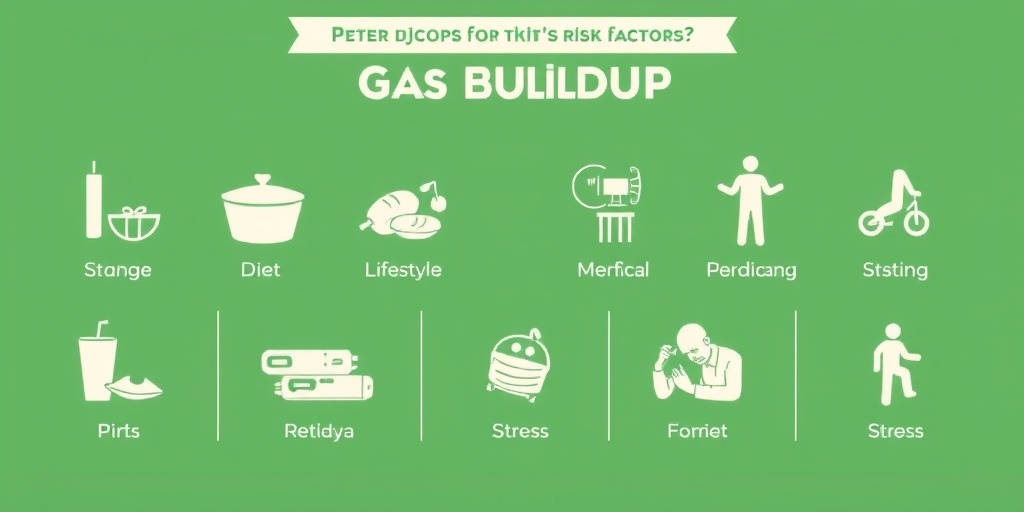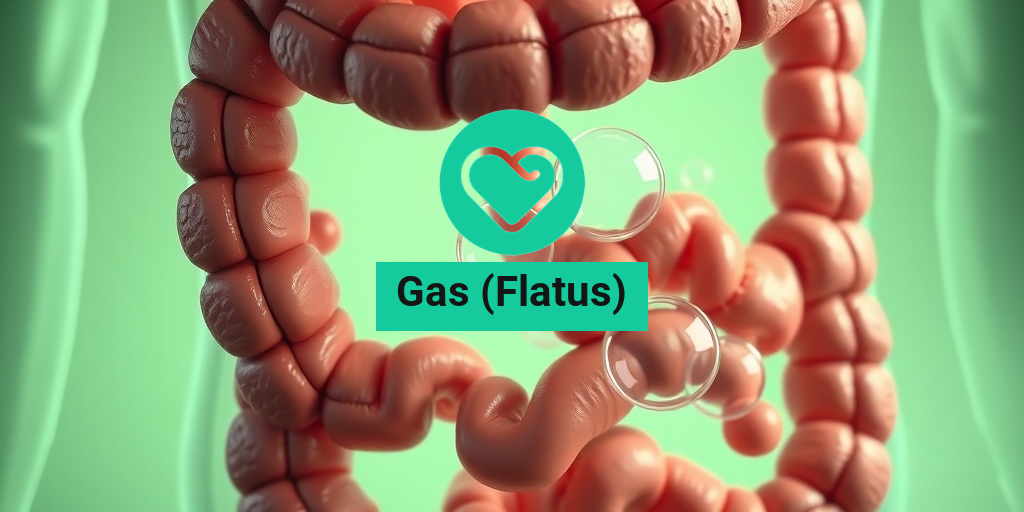What Is Gas (Flatus)?
Gas, commonly referred to as flatus, is a natural byproduct of the digestive process. It is composed of various gases that are produced when food is broken down in the stomach and intestines. While it may be a topic that many find humorous or embarrassing, understanding gas is essential for recognizing what is normal and when it might indicate a health issue.
The Composition of Flatus
Flatus is primarily made up of nitrogen, oxygen, carbon dioxide, hydrogen, and sometimes methane. The exact composition can vary based on several factors, including diet and gut bacteria. Here’s a breakdown of the common gases found in flatus:
- Nitrogen: The most abundant gas in flatus, making up about 20-90% of its composition.
- Oxygen: Present in smaller amounts, typically around 0-10%.
- Carbon Dioxide: This gas can account for 0-30% of flatus and is produced during digestion.
- Hydrogen: Produced by bacteria in the intestines, it can make up 0-50% of flatus.
- Methane: Not everyone produces methane, but for those who do, it can be a significant component of their flatus.
Why Does Flatus Occur?
Flatus occurs as a result of the digestive process. When we eat, we swallow air, which contributes to the gas in our intestines. Additionally, certain foods are more likely to produce gas due to their composition. Foods high in fiber, such as beans, lentils, and certain vegetables, can lead to increased gas production. This is because they are fermented by bacteria in the gut, resulting in the release of gas.
Moreover, some people may experience excessive gas due to food intolerances or digestive disorders. If you find yourself frequently passing gas or experiencing discomfort, it may be worth consulting a healthcare professional or checking resources like Yesil Health AI for more information.
Common Symptoms of Gas
While passing gas is a normal bodily function, it can sometimes be accompanied by discomfort or other symptoms. Here are some common symptoms associated with gas:
1. Bloating
Bloating is a feeling of fullness or swelling in the abdomen, often caused by the accumulation of gas. It can be uncomfortable and may lead to a distended appearance of the stomach.
2. Abdominal Pain
Gas can cause sharp or cramp-like pain in the abdomen. This discomfort is usually temporary and can be relieved by passing gas.
3. Flatulence
Flatulence, or the act of passing gas, is the most obvious symptom. While it is a normal part of digestion, excessive flatulence can be a sign of dietary issues or digestive disorders.
4. Belching
Belching, or burping, is another way the body releases gas. It occurs when air is swallowed and then expelled from the stomach. Frequent belching can also indicate that you are swallowing too much air while eating or drinking.
5. Changes in Bowel Habits
In some cases, gas can be accompanied by changes in bowel habits, such as diarrhea or constipation. If these changes persist, it may be a sign of an underlying condition that requires medical attention.
When to Seek Help
While gas is a normal part of life, certain symptoms may warrant a visit to a healthcare provider. If you experience severe abdominal pain, persistent bloating, or changes in bowel habits, it’s essential to seek medical advice. Resources like Yesil Health AI can provide valuable insights into your symptoms and help you determine the next steps.
In conclusion, understanding gas (flatus) and its symptoms can help you manage your digestive health better. Remember, while it’s a natural process, being aware of your body’s signals is crucial for maintaining overall well-being. 🌱

Causes of Excess Gas
Excess gas, commonly referred to as flatus, is a natural byproduct of digestion. However, when it becomes excessive, it can lead to discomfort and embarrassment. Understanding the causes of excess gas can help you manage it effectively. Here are some of the primary reasons why you might experience increased flatus:
1. Dietary Choices
Your diet plays a significant role in the amount of gas your body produces. Certain foods are notorious for causing gas, including:
- Beans and legumes: These are high in fiber and contain oligosaccharides, which can be difficult for some people to digest.
- Cruciferous vegetables: Broccoli, cauliflower, and cabbage can lead to gas due to their high fiber content and sulfur compounds.
- Dairy products: For those who are lactose intolerant, consuming milk and cheese can result in excess gas.
- Carbonated beverages: Sodas and sparkling water can introduce air into your digestive system, leading to increased flatus.
2. Swallowing Air
Another common cause of gas is aerophagia, which is the act of swallowing air. This can happen when you:
- Eat or drink too quickly
- Chew gum or suck on hard candies
- Talk while eating
When you swallow air, it can accumulate in your digestive tract, leading to discomfort and the need to pass gas.
3. Digestive Disorders
Some underlying health conditions can contribute to excess gas production. These include:
- Irritable Bowel Syndrome (IBS): This common gastrointestinal disorder can cause bloating and increased gas.
- Celiac Disease: An autoimmune disorder where the ingestion of gluten leads to damage in the small intestine, resulting in gas and bloating.
- Gastroesophageal Reflux Disease (GERD): This condition can lead to increased gas production due to the backflow of stomach contents.
4. Food Intolerances
Food intolerances, such as lactose intolerance or fructose malabsorption, can lead to excessive gas. When your body struggles to digest certain foods, it can ferment in the gut, producing gas as a byproduct.
Risk Factors for Gas Buildup
While anyone can experience excess gas, certain factors can increase your likelihood of experiencing this uncomfortable condition. Understanding these risk factors can help you take preventive measures.
1. Age
As we age, our digestive system may become less efficient. This can lead to an increase in gas production, making older adults more susceptible to flatus issues.
2. Gender
Interestingly, studies suggest that women may experience more gas than men. Hormonal fluctuations, particularly during menstruation, can affect digestion and lead to increased gas production.
3. Sedentary Lifestyle
A lack of physical activity can slow down digestion, leading to gas buildup. Regular exercise helps stimulate the digestive system, reducing the likelihood of excess flatus.
4. Smoking
Smoking not only introduces harmful substances into your body but also causes you to swallow more air, which can contribute to gas buildup. Quitting smoking can improve your overall digestive health.
5. Stress and Anxiety
Emotional factors can also play a role in digestive health. Stress and anxiety can lead to changes in gut motility, potentially resulting in increased gas production. Finding effective stress management techniques can help alleviate this issue.
In conclusion, understanding the causes and risk factors associated with excess gas can empower you to make informed choices about your diet and lifestyle. By addressing these factors, you can reduce the discomfort associated with flatus and improve your overall digestive health. 🌱💨

Diagnosing Gas Issues
Experiencing gas (flatus) can be uncomfortable and sometimes embarrassing. Understanding the underlying causes of gas is essential for effective management. Here, we’ll explore how to diagnose gas issues and identify potential triggers.
Understanding Gas (Flatus)
Gas, commonly referred to as flatus, is a natural byproduct of digestion. It consists of a mixture of gases, including nitrogen, oxygen, carbon dioxide, hydrogen, and sometimes methane. While passing gas is a normal bodily function, excessive gas can lead to discomfort and bloating.
Common Symptoms of Gas Issues
Recognizing the symptoms associated with gas can help you determine if you need to seek medical advice. Common symptoms include:
- Bloating: A feeling of fullness or swelling in the abdomen.
- Flatulence: The act of passing gas, which can be frequent or excessive.
- Abdominal Pain: Cramping or sharp pain in the stomach area.
- Belching: Releasing gas from the digestive tract through the mouth.
Identifying the Causes of Gas
To diagnose gas issues effectively, it’s important to consider various factors that may contribute to excessive gas production:
- Diet: Certain foods are notorious for causing gas, including beans, lentils, broccoli, onions, and carbonated beverages. Keeping a food diary can help identify specific triggers.
- Swallowing Air: Eating too quickly, chewing gum, or drinking through a straw can lead to swallowing excess air, which may contribute to gas.
- Food Intolerances: Lactose intolerance and gluten sensitivity can cause gas and bloating when consuming dairy or wheat products.
- Gut Health: An imbalance in gut bacteria can lead to increased gas production. Probiotics may help restore balance.
When to Seek Medical Attention
While gas is usually harmless, certain symptoms may indicate a more serious condition. Consult a healthcare professional if you experience:
- Severe abdominal pain
- Persistent changes in bowel habits
- Unexplained weight loss
- Blood in your stool
Home Remedies for Gas Relief
If you’re looking for relief from gas discomfort, several home remedies can help alleviate symptoms. Here are some effective strategies to consider:
Herbal Teas
Herbal teas can be soothing and effective in reducing gas. Consider trying:
- Peppermint Tea: Known for its calming effects on the digestive system.
- Ginger Tea: Helps reduce bloating and promotes digestion.
- Chamomile Tea: Can relax the digestive tract and reduce gas.
Dietary Adjustments
Making simple changes to your diet can significantly reduce gas production:
- Eat Slowly: Take your time while eating to minimize swallowed air.
- Avoid Carbonated Drinks: These can introduce excess gas into your digestive system.
- Limit Gas-Producing Foods: Reduce intake of beans, cruciferous vegetables, and high-fiber foods if they cause discomfort.
Physical Activity
Engaging in regular physical activity can help promote digestion and reduce gas buildup. Simple exercises like walking or yoga can be beneficial. Try these:
- Walking: A gentle walk after meals can aid digestion.
- Yoga Poses: Certain poses, like the “Wind-Relieving Pose,” can help release trapped gas.
Over-the-Counter Remedies
If home remedies aren’t enough, consider over-the-counter options. Products containing simethicone can help break down gas bubbles, providing relief. Always consult with a healthcare professional before starting any new medication.
By understanding the causes of gas (flatus) and implementing these home remedies, you can effectively manage and alleviate discomfort. Remember, if symptoms persist, it’s important to seek medical advice for a thorough evaluation. 🌿💨

Dietary Changes to Reduce Gas
Gas, or flatus, is a natural byproduct of digestion, but excessive gas can be uncomfortable and embarrassing. Making some dietary changes can significantly help in reducing the amount of gas you produce. Here are some effective strategies to consider:
1. Identify Trigger Foods
Some foods are notorious for causing gas. Keeping a food diary can help you pinpoint which items lead to increased flatus. Common culprits include:
- Beans and legumes: These are high in fiber and certain sugars that can be difficult to digest.
- Cruciferous vegetables: Broccoli, cauliflower, and Brussels sprouts can lead to gas due to their high fiber content.
- Dairy products: If you’re lactose intolerant, consuming milk, cheese, and yogurt can cause significant gas.
- Carbonated beverages: Sodas and sparkling water can introduce extra air into your digestive system.
2. Increase Fiber Gradually
While fiber is essential for digestive health, increasing your intake too quickly can lead to gas. Aim to add fiber-rich foods like fruits, vegetables, and whole grains gradually to your diet. This allows your digestive system to adjust without producing excess flatus.
3. Stay Hydrated
Drinking plenty of water helps your digestive system function smoothly. Adequate hydration can assist in breaking down food and reducing the likelihood of gas buildup. Aim for at least 8 glasses of water a day, and consider herbal teas like peppermint or ginger, which can soothe the digestive tract. 🍵
4. Chew Your Food Thoroughly
Taking the time to chew your food properly can aid digestion and minimize gas production. When you chew, you break down food into smaller pieces, making it easier for your stomach to digest. Additionally, chewing lessens the amount of air you swallow, which can also contribute to flatus.
5. Consider Probiotics
Probiotics are beneficial bacteria that can help balance your gut flora. Incorporating probiotic-rich foods like yogurt, kefir, and fermented vegetables can improve digestion and reduce gas. If you’re considering supplements, consult with a healthcare professional to find the right type for you.
6. Limit Artificial Sweeteners
Some artificial sweeteners, such as sorbitol and xylitol, can cause gas and bloating. These sweeteners are often found in sugar-free products and can be difficult for some people to digest. If you notice increased flatus after consuming these products, it may be best to limit or avoid them.
When to See a Doctor
While gas is a normal part of digestion, there are times when it may indicate a more serious issue. Knowing when to seek medical advice is crucial for your health. Here are some signs that you should consult a healthcare professional:
1. Persistent or Severe Symptoms
If you experience persistent gas that is accompanied by severe abdominal pain, bloating, or changes in bowel habits, it’s essential to seek medical attention. These symptoms could indicate conditions such as irritable bowel syndrome (IBS) or other gastrointestinal disorders.
2. Blood in Stool
Seeing blood in your stool is never normal and should be addressed immediately. This could be a sign of a more serious condition, such as inflammatory bowel disease (IBD) or colorectal cancer. Don’t hesitate to contact your doctor if you notice this symptom.
3. Unexplained Weight Loss
If you are losing weight without trying, it could be a sign of an underlying health issue. Unexplained weight loss, along with gas and other digestive symptoms, warrants a visit to your healthcare provider for further evaluation.
4. Difficulty Swallowing
Experiencing difficulty swallowing, known as dysphagia, can be a sign of a serious condition. If this symptom occurs alongside gas and bloating, it’s important to consult a doctor to rule out any potential issues.
5. Changes in Appetite
A sudden change in appetite, especially if accompanied by gas and other digestive symptoms, should not be ignored. This could indicate a problem with your digestive system that requires medical attention.
In summary, while gas (flatus) is a common occurrence, making dietary changes can help reduce its frequency and severity. However, if you experience concerning symptoms, don’t hesitate to reach out to a healthcare professional for guidance. Your health is paramount! 🩺

Frequently Asked Questions about Gas (Flatus)
What is gas (flatus)?
Gas (flatus) refers to the accumulation of gas in the digestive system, which is expelled through the rectum. It is a natural byproduct of digestion and can vary in composition and odor.
What causes gas (flatus)?
Gas can be caused by several factors, including:
- Swallowing air while eating or drinking
- Digestive processes that break down food
- Consumption of certain foods, such as beans, lentils, and carbonated beverages
- Food intolerances, such as lactose intolerance
What is the composition of flatus gas?
The composition of flatus gas typically includes nitrogen, oxygen, carbon dioxide, hydrogen, and sometimes methane. The specific mix can vary based on diet and individual digestive health.
Why does flatus gas occur?
Flatus gas occurs as a result of the digestive process. When food is broken down in the intestines, gases are produced as byproducts. Additionally, certain foods can lead to increased gas production.
What does it mean if my gas is particularly smelly?
Smelly farts can be attributed to the presence of sulfur-containing compounds in the gas. Foods such as broccoli, cabbage, and eggs can contribute to this odor. If the smell is accompanied by discomfort, it may be worth consulting a healthcare professional.
How can I reduce excessive gas (flatus)?
To minimize excessive gas (flatus), consider the following tips:
- Avoid carbonated drinks
- Eat slowly to reduce swallowed air
- Limit foods known to cause gas
- Stay hydrated and maintain a balanced diet
When should I see a doctor about my gas (flatus)?
If you experience persistent or severe gas accompanied by other symptoms such as abdominal pain, bloating, or changes in bowel habits, it is advisable to consult a healthcare professional for further evaluation.
Is passing gas (flatus) normal?
Yes, passing gas is a normal bodily function. Most people pass gas several times a day, and it is a sign that your digestive system is working properly. 😊




